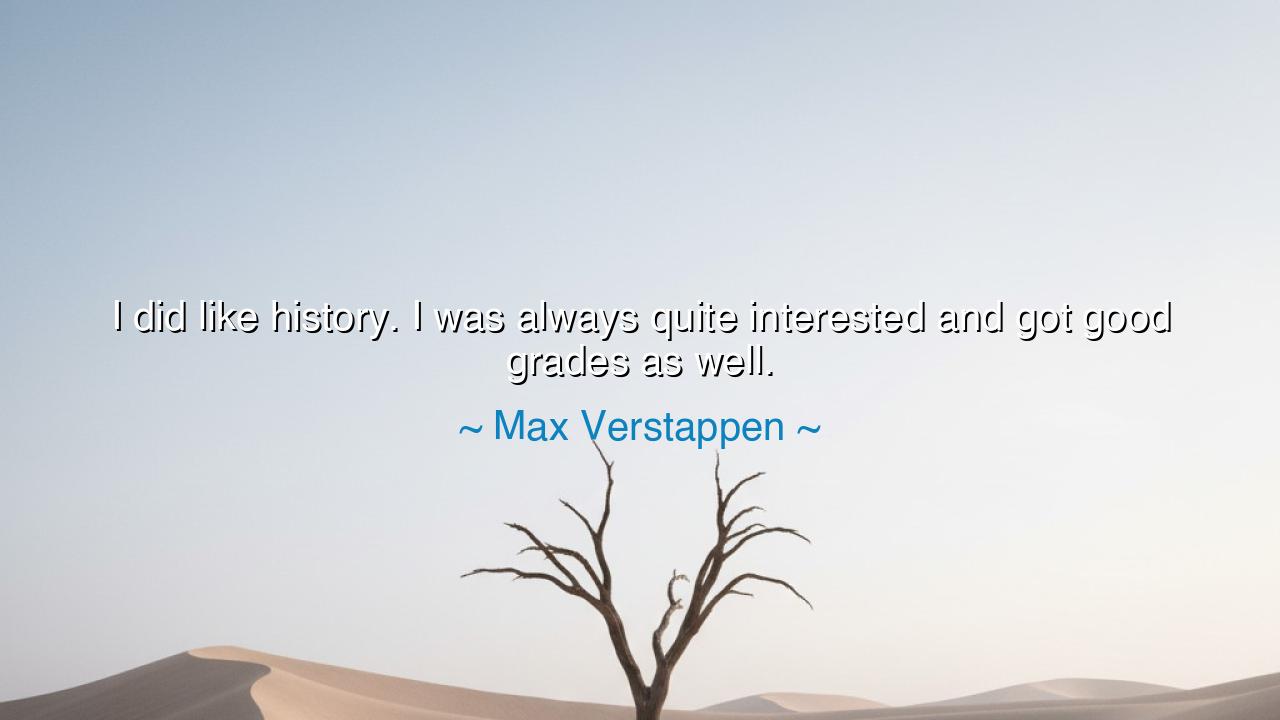
I did like history. I was always quite interested and got good






“I did like history. I was always quite interested and got good grades as well.” – Max Verstappen
At first glance, the words of Max Verstappen, the modern charioteer of speed and will, seem simple — a modest recollection from a man whose life blurs past at hundreds of miles per hour. Yet within this humble admission lies a profound truth, one that bridges the worlds of racing and remembrance. For history, to those who truly grasp its meaning, is not a cold record of names and dates. It is the pulse of humanity, the memory of triumph and failure that guides every step, every turn, every daring leap into the unknown. When Verstappen says he liked history, he is speaking not merely of study, but of connection — a quiet recognition that one cannot move boldly into the future without first understanding the road that brought us here.
In the ancient world, every hero was bound to the past. The Greeks told stories of Achilles and Odysseus not just to entertain, but to remember what courage, cunning, and tragedy meant. The Romans studied their ancestors’ conquests and defeats to forge wisdom for their own legions. Even the philosophers — Plato, Confucius, Seneca — drew from the history of men before them, understanding that the path of progress is illuminated by the light of remembrance. To like history is to be a student of the human spirit, to see in the deeds of others a mirror of what is possible, and what must be avoided.
Consider Verstappen’s own life as an unfolding lesson in this truth. His rise to dominance in Formula 1 did not begin in isolation, but upon the foundation laid by those who came before — Senna, Schumacher, Prost, Lauda — each one a chapter in the grand chronicle of the sport. Their triumphs taught him daring; their failures taught him patience. Like an ancient warrior studying the art of battle, Verstappen learned from the history of others before writing his own. His success was not born of arrogance but of awareness — awareness that greatness is never spontaneous; it is an inheritance, carried forward by those who respect the past enough to learn from it.
Too many today rush toward the future without thought of what has been. They chase innovation, fame, or victory without grounding themselves in wisdom, and thus their triumphs crumble like castles built on sand. But those who are interested in history — who understand where they stand in the chain of time — walk with steadier feet. They know that progress is not the enemy of memory. The fastest driver still depends on the roads carved by others; the boldest thinker still builds upon ancient ideas. The man who remembers the past does not stumble blindly into tomorrow — he drives through it with purpose.
Let us look to another example from the ages — Alexander the Great, who carried with him a copy of Homer’s Iliad wherever he went. Though he conquered empires, he saw himself not as a man apart, but as a continuation of the heroes before him. His love for history was not idle curiosity; it was fuel. It gave him identity, ambition, and a sense of belonging in the story of mankind. So too, every person who honors history is not just learning facts — they are finding their place in the grand continuum of human endeavor.
When Verstappen speaks of his interest in history, we hear not a casual remark but the seed of a mindset: curiosity joined with respect. To learn history is to train the mind for understanding, and the heart for humility. It is to see that one’s achievements, however great, are never solitary. Behind every victory stands the wisdom of generations — teachers, mentors, ancestors, and pioneers whose courage paved the way.
So let this be your lesson, traveler of time: do not race blindly toward the horizon. Look back — not to dwell, but to draw strength. Learn the stories of those who built the path beneath your feet. Read the chronicles of courage, of failure, of persistence. Be interested in history, not merely for grades or glory, but because it teaches you how to live, how to fight, and how to endure. For the one who remembers the past drives the future with steadier hands — and leaves behind a legacy that will, in turn, become history for others to learn from.






AAdministratorAdministrator
Welcome, honored guests. Please leave a comment, we will respond soon